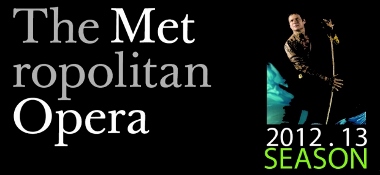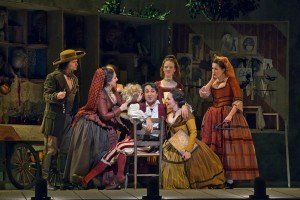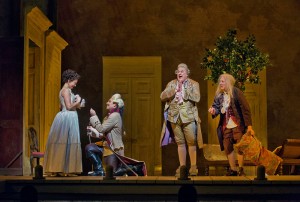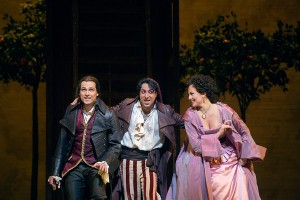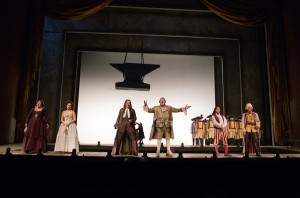THE ENGLISH TRANSLATION MAY LACK RHYTHM, BUT THIS IS ONE HILARIOUS AND UPLIFTING BARBER
If you’re looking to usher in the Holiday season with some good entertainment, then look no further than the Metropolitan Opera’s production of Gioachino Rossini’s The Barber of Seville. Following a traditional commedia dell’arte structure, this delightful French comedy is amusing and terrific fun for the whole family. Yes, an opera for the entire family. Cesare Sterbini’s original libretto has been translated to English. Though some of the beauty and lyricism is lost in the conversion, the performances and uplifting nature of the show are well worth the price of admission.
Should love be sought after at all costs? According to Spanish Count Almaviva (the dashing Alek Shrader), it should. After falling in love at first sight with Rosina (the sensational and beautiful Isabel Leonard), a young woman kept under lock and key by her guardian Dr. Bartolo (the commanding John Del Carlo), Almaviva endeavors to do everything possible to win her heart, even if that includes a ton of deception.
Ironically, to make sure that her affections are true, he proceeds to do everything untrue in courting her. Instead of presenting himself as the wealthy nobleman that he is, Almaviva disguises himself as a poor college student named Lindor. His plan starts working until he discovers that Dr. Bartolo intends on marrying Rosina himself, an idea that Rosina finds loathsome. To help rescue Rosina from Dr. Bartolo’s clutches, Almaviva hires his former servant Figaro (the delightfully expressive Rodion Pogossov), the local barber, at an attractive wage. Since Figaro, a self-proclaimed pleasure and money-loving chap, can’t resist the money or the challenge, he agrees to be an accomplice. Of course, one lie often begets more lies, so the situation gets harrier with more lies, more disguises, and luckily, more amusement.
Based on the first of three Figaro plays written by Pierre Augustin Caron de Beaumarchais (1732-1799), The Barber of Seville is considered to be an explosive piece because it takes place just before the French revolution and discusses how the working class outsmarts their powerful employers. Because this opera presents this material in a light-hearted manner, a very poignant and dangerous theme is communicated successfully but not forcefully.
Unfortunately, some of the rapturous melodies traditionally sung in French and Italian are lost with J.D. McClatchy’s English translation. Though McClatchy does a good job of retaining the theme and plot details, the fluidity that exists in an opera typically sung in the romance languages just isn’t there in English. There are simply too many English words packed into each phrase.
Fortunately, that doesn’t prevent the performers from executing the songs. Though the songs are not sung in the original tongue, the actors still impress with the vocal gymnastics that are required to carry out each tune. Leonard is especially charged with taking some strenuous vocal leaps, and she does so like a pro, while also being clever and devious to boot.
Other actors have few words, but still make their presence known. As Dr. Bartolo’s servant Ambrogio, Rob Besserer leaves his mark every time he walks on stage. Whether falling dramatically on the floor, getting lit on fire, being hit by a falling tree, or simply – and literally – pulling a set piece across the stage, Besserer always does something memorable and funny. Thanks to the amusing direction by Bartlett Sher, he is The Barber of Seville’s secret weapon.
Another weapon used effectively, despite diminished fire power, is Michael Yeargan’s scenery. When first seen, a series of neutral-colored, double sliding doors, moving drunkenly across the stage, is a great way to set the tone for the comedy. Unfortunately, though practical and aesthetic in the beginning, when added against a backdrop of similar hues, the doors wash out the set and don’t reflect any of the passion that ultimately exists in the opera, especially between Almaviva and Rosina.
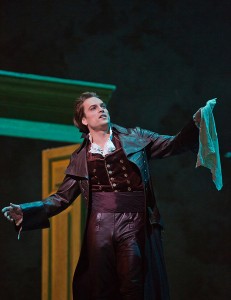 With a running time of just over 2 hours, The Barber of Seville is the perfect length for those with limited attention spans and those prone to restlessness – namely children and those unaccustomed to opera. It’s also an acceptable length of time to either be away from your family during the holidays or to be spent with them. The production may not be flawless, but it’s certainly a pleasure.
With a running time of just over 2 hours, The Barber of Seville is the perfect length for those with limited attention spans and those prone to restlessness – namely children and those unaccustomed to opera. It’s also an acceptable length of time to either be away from your family during the holidays or to be spent with them. The production may not be flawless, but it’s certainly a pleasure.
photos by Ken Howard/Metropolitan Opera
The Barber of Seville
Metropolitan Opera in New York City
scheduled to end on January 5th, 2012
for tickets, call 212-362-6000 or visit http://www.metoperafamily.org
